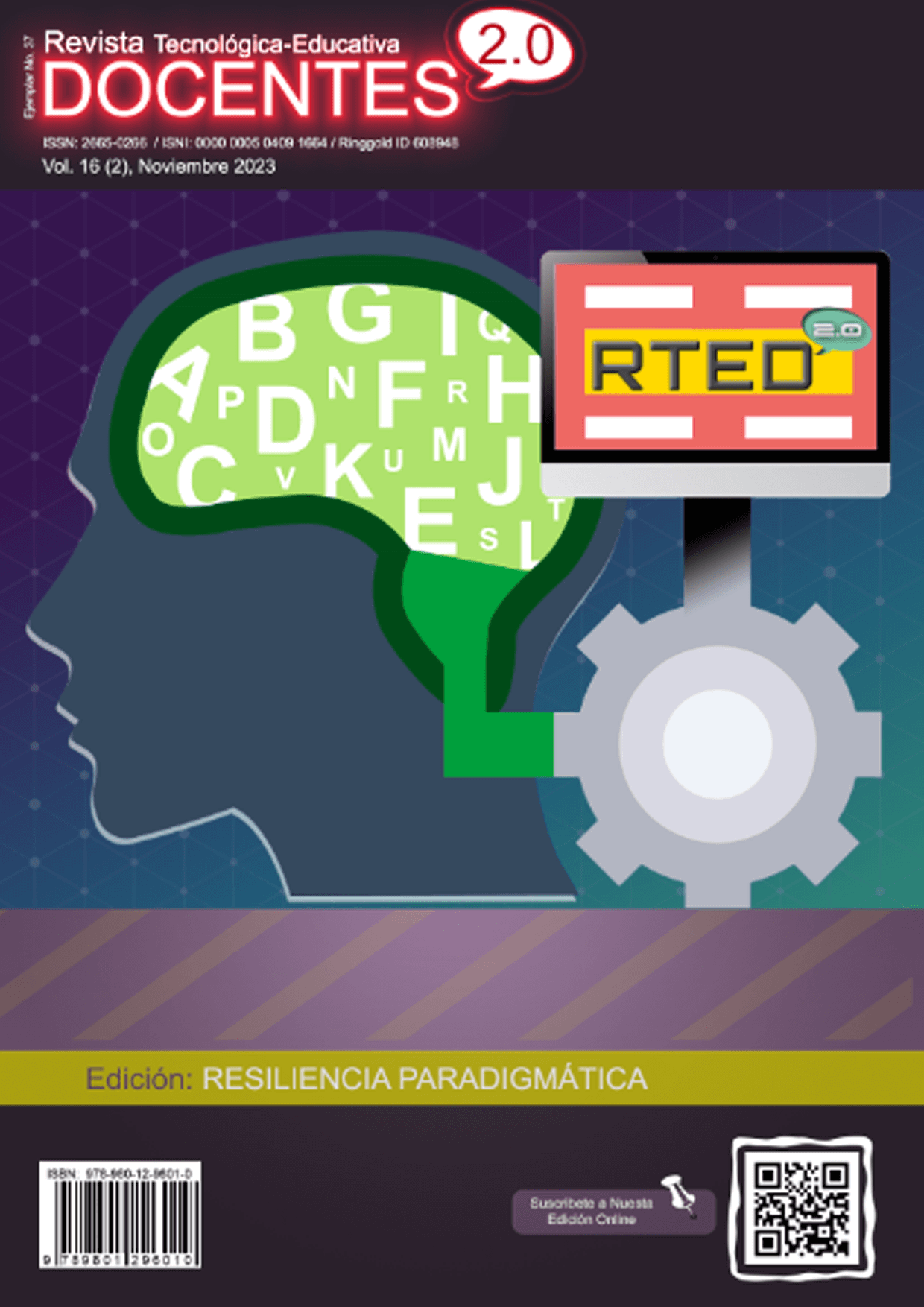Artificial Intelligence as a Catalyst in the Teaching of History: Challenges and Pedagogical Possibilities
 DOI:
https://doi.org/10.37843/rted.v16i2.426
DOI:
https://doi.org/10.37843/rted.v16i2.426
Main Article Content
Abstract
The teaching of history plays a fundamental role in the citizenship education of students; however, the predominance of traditional history education hinders the achievement of this formative purpose. In this context, artificial intelligence (AI) emerges as an innovative tool that can enrich students' historical learning. This essay was conducted under the inductive method, the humanistic paradigm, with a qualitative approach, interpretative type, and topical narrative design. The objective was to analyze the challenges and opportunities of artificial intelligence (AI) in teaching history, examine the use of this technology, and describe the key applications in this subject. In this regard, technical challenges were identified, such as the accuracy of algorithms and the availability of digitized historical documents, as well as ethical considerations related to student privacy, limited human interaction in AI systems, and the adoption of diverse historical interpretations in the narration of past events; despite this, it is argued that AI can improve students' historical understanding and transform their educational experience. In conclusion, it is recommended to carry out additional research and reflections to delve into the subject and insist on addressing technical limitations and maintaining a balanced pedagogical approach between AI and human interaction in history teaching to train critical and responsible citizens.
Downloads
Metrics
Article Details

This work is licensed under a Creative Commons Attribution-NonCommercial-NoDerivatives 4.0 International License.
Those authors who have publications in our journal accept the following terms:
- When a work is accepted for publication, the author retains rights of reproduction, distribution of his/her article for exploitation in all countries of the world in the format provided by our magazine and any other magnetic medium, optical, and digital.
- Authors will retain their copyright and guarantee the journal the right first to publish their work, which will be simultaneously subject to the Creative Commons Acknowledgment License (Attribution-NonCommercial-NoDerivatives 4.0 International (CC BY-NC-ND 4.0)). That allows third parties to copy and redistribute the material in any medium or format, under the following conditions: Acknowledgment - You must properly acknowledge authorship, provide a link to the license, and indicate if any changes have been made. You may do so in any reasonable way, but not in a way that suggests you have the licensor's endorsement or receive it for your use. NonCommercial - You may not use the material for a commercial purpose. NoDerivatives - If you remix, transform, or build from the material, you cannot broadcast the modified material. There are no additional restrictions - You cannot apply legal terms or technological measures that legally restrict you from doing what the license allows.
- Authors may adopt other non-exclusive license agreements to distribute the published version of the work (e.g., deposit it in an institutional archive or publish it in a monographic volume) provided that the initial publication in this journal is indicated.
- Authors are allowed and recommended to disseminate their work through the Internet (e.g., in institutional telematic archives, repositories, libraries, or their website), producing exciting exchanges and increasing the published work's citations.
- Request of withdrawal an article has to be done in writing by the author to the Editor, becoming effective after a written response from the Editor. For this purpose, the author or authors will send correspondence via e-mail: [email protected].
- The author will not receive financial compensation for the publication of his work.
- All Docentes 2.0 Journal publications are under the Open Journal System (OJS) platform at: https://ojs.docentes20.com/.
References
Álvarez, H. (2021). Evaluación del pensamiento histórico de estudiantes de secundaria a través de la construcción de narrativas históricas sobre los pueblos originarios de Chile. Años 90, (28), 1-18. https://doi.org/10.22456/1983-201X.111650 DOI: https://doi.org/10.22456/1983-201X.111650
Álvarez, H. (2023). El laboratorio histórico como estrategia de indagación para desarrollar el pensamiento histórico en la formación del profesorado de Historia. Interciencia, 48(5), 245-251.
Barrios, H., Díaz, V., & Guerra, Y. (2021). Propósitos de la educación frente a desarrollos de inteligencia artificial. Cadernos de Pesquisa, (51), 1-18. https://doi.org/10.1590/198053147767 DOI: https://doi.org/10.1590/198053147767
Bonam, B., Piazentin, L., & Dala, A. (2020). Educación, Big data e inteligencia artificial: Metodologías mixtas en plataformas digitales. Comunicar, (65), 43-52. https://doi.org/10.3916/C65-2020-04 DOI: https://doi.org/10.3916/C65-2020-04
Devi, S., Sreedhar, B., Arulprakash, P., Kazi, K., & Radhakrishnan, R. (2022). A path towards child-centric artificial intelligence-based education. International Journal of Early Childhood, 14(3), 9915-9922. 10.9756/INT-JECSE/V14I3.1145
Flores, J., & García, F. (2023). Reflexiones sobre la ética, potencialidades y retos de la inteligencia artificial en el marco de la Educación de Calidad (ODS4). Comunicar, (74), 37-47. https://doi.org/10.3916/C74-2023-03 DOI: https://doi.org/10.3916/C74-2023-03
García, F. (2023). La percepción de la inteligencia artificial en contextos educativos tras el lanzamiento de ChatGPT: Disrupción o pánico. Education in the Knowledge Society, (24), e31279-e31279. https://doi.org/10.14201/eks.31279 DOI: https://doi.org/10.14201/eks.31279
Incio, F., Capuñay, D., Estela, R., Valles, M., Vergara, S., & Elera, D. (2021). Inteligencia artificial en educación: Una revisión de la literatura en revistas científicas internacionales. Apuntes Universitarios, 12(1), 353–372. https://doi.org/10.17162/au.v12i1.974 DOI: https://doi.org/10.17162/au.v12i1.974
Luckin, R., George, K., & Cukurova, M. (2022). AI for school teachers. CRC Press. DOI: https://doi.org/10.1201/9781003193173
Olite, F., Suárez, I., & Vidal, M. (2023). Chat GPT: Origen, evolución, retos e impactos en la educación. Educación Médica Superior, 37(2), 1-23. https://ems.sld.cu/index.php/ems
Papert, S. (1993). The children's machine: Rethinking school in the age of the computer. Basic Books.
Parra, J. (2022). Potencialidades de la inteligencia artificial en educación superior: Un enfoque desde la personalización. Revista Tecnológica-Educativa Docentes 2.0, 14(1), 19-27. https://doi.org/10.37843/rted.v14i1.296 DOI: https://doi.org/10.37843/rted.v14i1.296
Rivero, P., Aso, B., & García, S. (2023). Progresión del pensamiento histórico en estudiantes de secundaria: Fuentes y pensamiento crítico. Revista Electrónica de Investigación Educativa, (25), 1-15. https://doi.org/10.24320/redie.2023.25.e09.4338 DOI: https://doi.org/10.24320/redie.2023.25.e09.4338
Schank, R. (1995). Tell me a story: Narrative and intelligence. Northwestern University Press.
Selwyn, N. (2022). The future of AI and education: Some cautionary notes. European Journal of Education, 57(4), 620-631. https://doi.org/10.1111/ejed.12532 DOI: https://doi.org/10.1111/ejed.12532
Simon, H. (2019). The sciences of the artificial. MIT Press. DOI: https://doi.org/10.7551/mitpress/12107.001.0001






